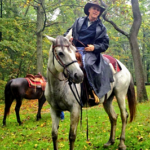 | © Susan Sexton
| © Susan SextonWere you in the barn late last Christmas Eve? Did you witness any, ummm, unusual happenings such as … voices? According to an old folk-tale, Christmas Eve is the one time of year when all the animals in the barn are gifted with the ability to speak, as people speak, until the dawn of Christmas morning.
Now, I’ve never been fortunate enough to experience this for myself, or to know anyone else who has. But I have wondered what our horses might have to say if they were given the opportunity to have the voice of humans once a year.
Maybe it would be an atmosphere like the local barbershop or beauty parlor-horses laughing and joking, giving their opinions on everything from grooming to hoof care, or even relationships (both equine and human!) in the barn…
Perhaps our horses are more aware than we’d think of events in the world, and would be full of be full of political advice. (I guess this would be determined by how often the barn radio is tuned to news programs or talk radio.)
Would they discuss the latest stable gossip, plan practical jokes to play on people (the old poop-in-the-water-bucket is always good for a laugh), or gripe about the food? Maybe they would just talk for the novelty of hearing themselves talk!
And here’s something I’ve always wondered: Would they speak French in France, German in Germany, and Russian in Russia, or would they speak English no matter where they were? (And would a recent European import in an American barn need a translator?) Would they ask for more cookies, carrots, and other treats? Or would they simply comment on the freshness of the hay and how well the turnout schedule suits (or doesn’t)?
An even bigger question in my mind would be their response if I asked why they felt they had been gifted for this once-a-year occasion. I wonder if they would feel it was simply because they are horses (which entitles them to special treatment, as we all know) or if they feel it’s only fair since it is Christmas and it was a donkey (related to the horse indirectly, of course) that carried Mary to the birthplace of baby Jesus? Maybe they simply accept what is, without question.
I, personally, would have difficulty refraining from asking them as many additional questions as possible. And dawn comes quickly, especially on Christmas morning.
I have “talked” to a lot of horses in the course of my work as an animal communicator, and I can honestly say that the answers to my questions, or to yours, would probably depend on the horse we were speaking to. They are all such individuals. I’m sure many horses would be quite sentimental and offer their expressions of gratitude for the partnership they have with their person, or take the opportunity to let that person know how very much they are appreciated.
On the other hand, depending on your relationship with your horses, maybe all they will repeat are the words you would never say in front of your mother, or in church on Christmas morning–but may have said when you dropped that salt block on your foot. (If you have young children, you have probably already become accustomed to this unwelcome replay of your unguarded vocabulary and know that whatever they repeat will probably be the most inappropriate thing at the time it would cause you the most embarrassment.) If you have a mischievous-natured horse, and a tendency to express yourself freely in the barn, I would advise you to keep your mother out of the barn on future Christmas Eves–just in case.
My conversations with horses have yielded quite an array of responses that provoke thoughtfulness, self-reflection, laughter, and even tears. Oftentimes, horses express the need to be considered as “a being with feelings,” rather than a working machine or “yard art.” The majority of horses appreciate being considered as capable of having an opinion, and being made to feel useful. Their personalities are so distinct and they can be quite expressive on certain topics.
There are few horses, for instance, who fail to reveal feelings of frustration towards people they feel take them for granted, or feelings of appreciation and thoughtfulness for those who don’t. They really aren’t much different from people, when it comes to emotions.
Ben, a horse in Delaware who’s stabled alone, would like to “have someone (another horse) to spend time with” when he isn’t working because “it is too quiet in the barn at night.”
Bluesey in Ohio says, “I like that (my owner) talks to me,” while Penny in Canada is “thankful to have a warm place in the barn.”
Copper in Arizona, quite a jolly little fellow, feels he was sent to be with his person “because she needs me as much as I need her.”
Gunner in Texas says, “It is important for me to take good care of him (owner) because he appreciates me and our work is important.”
One of the most touching conversations I have ever had was with Angel in California, who feels her job has been to bring happiness to her person who, one year before, had lost a child in an auto accident. I can honestly say I never cried so much during a conversation until then.
One of the funniest conversations, by contrast, was just the other day, when I spoke to Neville in Indiana. He “loves music and dancing.” His owner tells me that he sways, in rhythm, to the music in the barn. I thought I was smiling before the conversation, but by the time we finished the conversation, my face hurt from smiling so much and my ribs were sore from laughter.
Then there’s White O’ Morn (a.k.a. “Girly”), a lovely racehorse in Illinois (also with quite a sense of humor). She tells the Christmas Eve legend from a slightly different perspective.
“According to ancient horse lore,” she said to me recently, “Christmas Eve is the one time of year that all the humans in the barn are gifted with the ability to speak, like horses, until the dawn of Christmas morning…”
Practical Horseman magazine featured Carrie Allen in its April 2002 “My Life” column.







